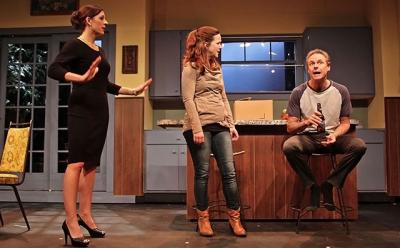Food, Family, and a Secret or Two

For its second production of the season, the Hampton Theatre Company in Quogue has put “Dead Accounts” by Theresa Rebeck on the table — along with an outrageous assortment of foodstuffs. A tale filled with moral dilemmas that will have audiences debating long after they leave, the evening buzzes along quickly and smoothly, sort of like that “very special episode” of a well-loved sitcom, where something serious goes down even in the midst of the laughs.
The play, noted during its Broadway run more for its cast (which included the Tony Award-winning Norbert Leo Butz and Katie Holmes, recently relieved of her Cruise control) than its content, was not particularly well-received and closed early due to poor ticket sales. Knowing this before entering the Quogue Community Hall made a reviewer wonder why a small local theater would choose a piece that isn’t a guaranteed crowd-pleaser, or, to be blunt, a guaranteed money-maker. But the Hampton Theatre Company is no ordinary community theater. Clearly, it has cojones grandes, a fact demonstrated by the opening scene of “Dead Accounts,” in which John Carlin, who gives an inspired performance as Jack, drops the F-bomb more often than three Scorsese films strung together. This is not “Hay Fever,” folks.
“Dead Accounts” tells the tale of Jack Leonard, who left his childhood home in Cincinnati years before for Wall Street wealth and has returned in the dead of night under mysterious circumstances, minus his wife but with a boatload of unexplained cash. The first scene, which features Mr. Carlin and Mary McGloin as Jack’s stay-at-home, care-giving sister, Lorna, crackles with intensity as Jack talks nonstop while working his way through pint after pint of Graeter’s ice cream, a Midwestern staple.
Ms. McGloin gives a strong and heartfelt performance as the sister who has given up her own life to help their mother (played wonderfully by Diana Marbury) look after their ailing dad. In fact, the entire cast — rounded out by Peter Connolly as Phil, Jack’s childhood friend and possible romantic interest for Lorna, and Rebecca Edana, Jack’s blue-blooded, icy wife — turns in strong performances, switching between humor and sadness, happiness and anger, hatred and horniness, with all the ease of a real dysfunctional family.
Some of the funniest moments come whenever Lorna is on an important phone call and her mom launches into a continuous, nonsensical list of questions, directed both at her and whoever is on the line. It seemed everyone in the opening-night audience could relate.
And some of the most poignant moments also come from Ms. McGloin’s character, especially from her astute views of Wall Street and Park Avenue millionaires. “They have so much money they’re exhausted,” she observes.
Mr. Carlin rules the stage as Jack, whose nonstop energy may come from the pills in his pocket or the vast array of Skyline cheese and chili coneys he puts in his belly. His character disdains the over-indulgence of New Yorkers while bringing a dozen pizzas into the kitchen, to the horror of his family.
Many references are made comparing that old-money sensibility to that old-time religion, a staple of the Leonard household, and who uses what to plug the gaping hole in their hearts. For the most part, though, Ms. Rebeck’s script doesn’t plug that hole. It doesn’t offer any new insight, although it poses interesting questions, especially about how Jack became a millionaire on the run from the law and his wife’s family.
Andrew Botsford directs “Dead Accounts” with a sure hand, hitting all the comedy notes and allowing the actors to bloom in their moral monologues. Peter-Tolin Baker’s Buttermilk Blue cabinetry and flowered wallpaper evokes a tired, Midwestern kitchen (although there was a surprising lack of religious motif, considering the staunch Catholicism of its inhabitants), and Sebastian Paczynski’s dappled lighting adds to the hidden subtext while providing the countrified feel of a house in the country.
It is the memories of his roots in a simpler childhood that bring Jack to his own epiphany — sort of. Presumably, Ms. Rebeck received an important phone call of her own while scripting the conclusion of “Dead Accounts,” leaving the final scene up to the imagination. Still, the Quogue production offers all the color and form contained within the divergent branches in a family tree, and by presenting this play has gone out on a limb, proving that creativity has been seeded and continues to grow at the Hampton Theatre Company.
